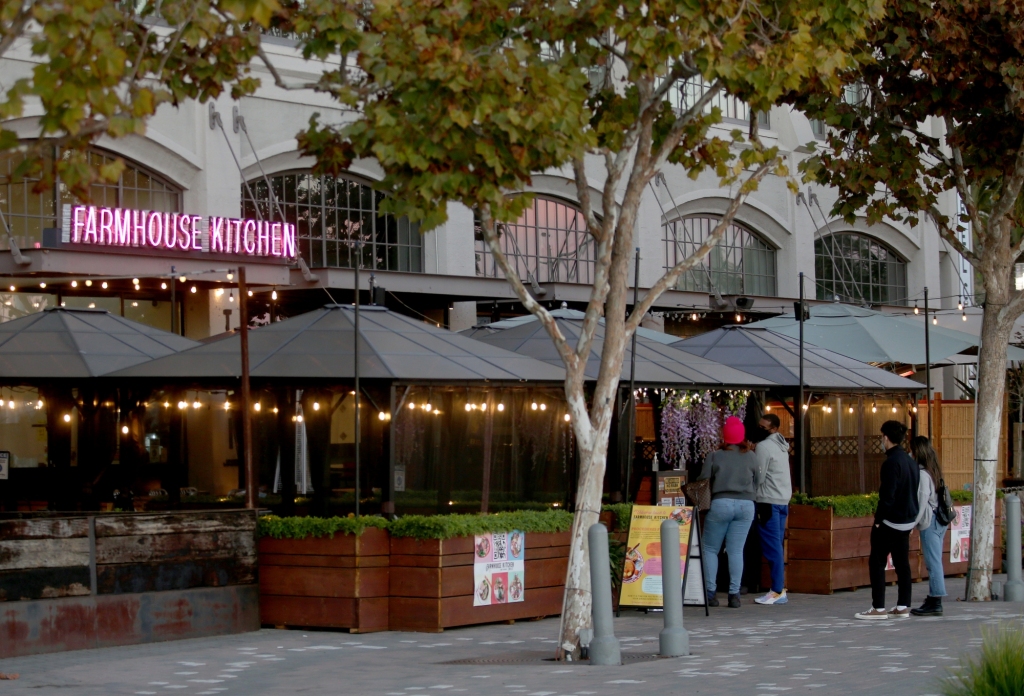OAKLAND — The pandemic-era program allowing restaurants to set up parklets and other outdoor dining areas is here to stay — with a few modifications.
The City Council voted unanimously Tuesday to approve a permanent form of the Flex Streets program, which established a free streamlined permitting system by which restaurants, cafes and retail businesses can use sidewalks, streets, parking lots or other private outdoor space to seat people outside.
The plan is to keep some of the elements that currently allow restaurants to set up outdoor dining space — which enabled many of them to generate enough business to keep their establishments running and staffed — without all of the permitting processes that made that difficult before the pandemic.
Many Bay Area cities have had to make choices about how to move forward with a business-friendly program that has been popular among diners and restaurant owners. Pleasanton earlier this year ordered its restaurants to remove all their outdoor parklets, tents and other street dining setups. San Jose officials, meanwhile, plan to help restaurants transform their temporary parklets into permanent fixtures across the city.
Before the pandemic Flex Streets program, an Oakland business who wanted a sidewalk cafe or parklet had to get an “encroachment” permit, which required a laundry list of documents to submit including a detailed site plan, a grant deed and legal description and others, as well as coordinating multiple city departments ranging from planning to transportation to the fire department to the economic and workforce development department. Fees for doing so could approach $3,000.
With Flex Streets, businesses who want to create a parklet or put tables and chairs outside on the sidewalk or on private property like their parking lots need only to fill out a free application online, which is automatically accepted. Creating a setup that would require a lane of traffic to be closed requires more work: businesses submit an interest form and work with staff in the Economic and Workforce Development Department to develop drawings that the city’s Department of Transportation needs to approve.
More than 140 sidewalk cafes and parklets sprouted up during the Flex Streets program — a big increase from the previous two fiscal years, which saw just one new sidewalk cafe and no parklets. The program was also used to allow for 13 street closures, 14 permits for outdoor private space and more than 60 permits for mobile food trucks — which previously were given out on a very limited basis — according to a report created by Greg Minor, Assistant to the City Administrator, who has been a point person for the program. Most of the parklets and street closures, however, have been in downtown, uptown and North Oakland. City staff found through surveying businesses throughout the city that many East Oakland businesses reported not knowing about the streamlined program, and some were concerned about setting up outdoor dining on certain streets that had high traffic.
For businesses who were able to implement it, however, it proved successful: most businesses who used the program told the city that the parklets increased operating space by 30% to 40%, and some had 100% of their seating outside, due to the small size of their indoor restaurants.
“This program has been extremely valuable and helpful both during the pandemic but also opened our eyes to what could be in terms of potential for more commercial and economic viability for our businesses to extend outdoor dining as well as the opportunities for supporting small local businesses across the city,” said District 6 Councilmember Loren Taylor, who is running for mayor.
Added District 4 Councilmember Sheng Thao, who is also running for mayor, “We were able to see how much more we can do to support our local businesses.”
The program will continue permanently with its streamlined approach for parklets and sidewalk seating, but starting July 2023, there will be some application and permit fees businesses must pay if they don’t meet an “equity criteria.” The city has not provided a public rubric for that criteria, but a report sent to the council offered an example as being a business located in a part of the city that has been disproportionately impacted by COVID-19. It also has not yet said what the fees will be but the staff report noted that the fees will be determined in a future council action as part of the approval of a “master fee schedule” for many city application fees. For restaurants that operate outdoor seating on their own parking lot, they would not have to pay fees until at least December 2023, as the city completes its general plan amendments for parking.
For businesses that want to close traffic lanes for operations, they will have to get City Council approval and pay fees if the closures are longer than three days, starting in July 2023. But there will be no limit to the number of street closures per year, as there were before the pandemic. The city will also remove the previous limit on permits for mobile food vendors, allowing an unlimited number of mobile vendor permits across the city as long as there are certain buffers between them and brick-and-mortar businesses, and starting in July 2023, they’ll have to pay an application and annual permit fee to operate.









